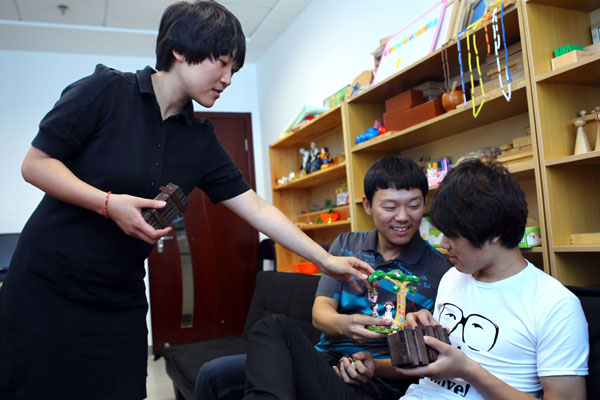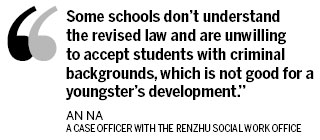
Zhang Yu could be staring at the inside of a cell right now. After being found guilty of a serious assault in December 2010, the 18-year-old had been facing up to a year in a juvenile detention center.
Instead, he spends much of his time these days volunteering at a community center.
Zhang is one of four teenagers taking part in a pilot project run by Beijing's Xicheng district procuratorate that aims to rehabilitate young offenders through education and community service.
 |
|
An Na and Wang Long, case officers with the Renzhu Social Work Office, give guidance to Zhang Yu (right), a young offender taking part in a pilot project to rehabilitate juvenile offenders through education and community service, in Beijing this month. Zou Hong / China Daily |
"Each of them needs to attend the center more than 10 hours a month, in addition to participating in social activities," said Zhao Yan, a juvenile correction official in the Xicheng district procuratorate. "If Zhang stays out of trouble while serving his sentence (at least six months), he'll face no further court action and the crime will be wiped from his record."
The project, which is managed by the Renzhu Social Work Office, is in line with new guidelines in the revised Criminal Procedure Law, which takes effect in January. However, the district decided to start early and launched it in April.
The criteria for offenders who qualify are strict: There is a designated list of crimes, including robbery, theft and public disorder, while their sentences must be no longer than a year.
A better place

When I first saw Zhang, he was taking a class on volunteering work with 20 high school students at Xinjiekou Community Center in Xicheng.
Afterward, An Na, one of two case officers with the Renzhu Social Work Office and in charge of day-to-day operations, brought the teenager to a room on the second floor for an interview.
Zhang, who hails from rural Yanqing county in the western suburbs of Beijing, sat down stiffly on a black sofa, staying largely silent with his head lowered. "He's a shy boy," An said, attempting to break the ice.
She explained that the youngster had attacked a teacher at a bus stop in Deshengmen in the winter in 2010, when he was only 17. The victim, 10 years his senior, had allegedly jumped a bus line in Yanqing, leading to one of Zhang's friends being unable to board.
Zhang, who was downtown, received a call from the friend to tell him to lie in wait and teach the teacher a lesson.
"I didn't think twice and hit the teacher's head with a brick," said Zhang. "I wanted to run away, but the guy's girlfriend grabbed my belt and called the police."
Wang Yuanyuan, director of Xicheng's prosecution authority's juvenile crime division, who was also present at the interview, said that as Zhang's offense was not serious and he confessed, he was deemed suitable for the pilot program.
"I know I did something wrong," Zhang said. "I'm just glad I could serve my sentence outside prison."
According to Wang, authorities believe the work of the Renzhu Social Work Office can prevent youngsters from committing crimes in the future, unlike detention houses that can make them more likely to reoffend.
Since April, when Zhang started visiting the Xinjiekou Community Center, he has watched educational movies about crime and the legal process, watched a juvenile case being tried in court and has taken part in volunteering work, including acting as a teaching assistant and regularly cleaning the classrooms.
"Zhang can decide when he wants to take part in activities," An said. "We'll make an appointment with him first so he can keep his privacy."
At this point in the interview, Wang Long, 23, the other case worker at Renzhu, picked up a Rubik's Cube and handed it to Zhang to play with, explaining that brain-training puzzles can be used to help correct a juvenile's behavior.
"I play badminton (with Zhang), and we often chat, so I know what he's thinking about," Wang said. "I also prepare a psychological test once a month for him, which reflects his mental state."
As the two case officers talked, Zhang went to the washroom. "He's not good at expressing his feelings and lives alone with his father, so we have to work really hard to get through to him," An said.
The young offender heard the comment as he re-entered the room and added that he was just unwilling to talk with strangers.
"I see Wang and An as my older brother and sister. After all, they give me a lot of care," Zhang said.
Although everyone seemed to think Zhang has shown progress over the last few months, the teenager admitted that he did not really understand what he was agreeing to when prosecutors suggested he take part in the pilot program.
"Most of what they said was just legal language," he said. "I just thought it could be good for me, as they said the crime could be wiped from my record and that I wouldn't have to go to prison."
An said his office is not involved in the process of selecting candidates, but added that he feels it is common for young offenders not to understand what the program entails, or have any knowledge of the revised law, as prosecutors use legal jargon.
"However, there have also been youngsters who preferred to go into detention rather than receive community correction," An said. "Those who accepted the correction have to confess their crime, but some want the chance to prove their innocence in court."
A bright future
In addition, the program can affect an offender's education, she said, explaining that teachers at Zhang's vocational school persuaded him to quit his course in car mechanics after he was absent for 15 days.
"Some schools don't understand the revised law and are unwilling to accept students with criminal backgrounds, which is not good for a youngster's development," An said.
Zhang, who lives at home and works part time at a karaoke bar in Yanqing, said he has decided to continue his studies after the program and also wanted to join the social work team in the future.
"I'm interested in engine repair. I'll first get a driver's license and learn something about that," he added.
caoyin@chinadaily.com.cn







